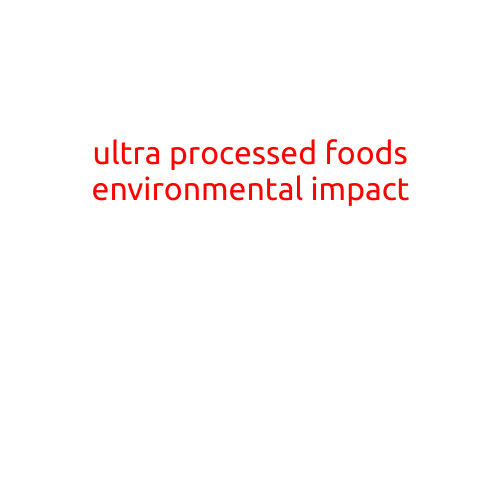
The Hidden Environmental Impact of Ultra-Processed Foods
As the world grapples with the challenges of climate change, food waste, and sustainable living, a growing body of research is shedding light on the often-overlooked environmental impact of our food choices. One area of particular concern is the production, distribution, and consumption of ultra-processed foods, which make up a significant portion of many modern diets.
What are Ultra-Processed Foods?
Ultra-processed foods are products that have undergone significant processing and transforming through various physical, chemical, or biological methods to change their original form. These foods are often characterized by the use of additives, preservatives, and other ingredients to extend shelf life, enhance flavor, and texture, and make them more convenient to consume. Examples of ultra-processed foods include:
- Packaged snacks like chips, crackers, and cookies
- Frozen meals and TV dinners
- Processed meats like hot dogs and sausages
- Sugary beverages and sweetened yogurt
- Instant noodles and soups
- Refined grains like white bread and sugary cereals
The Environmental Impact of Ultra-Processed Foods
The production, distribution, and consumption of ultra-processed foods have a significant environmental impact, contributing to a range of issues, including:
- Greenhouse Gas Emissions: The production of ultra-processed foods generates significant greenhouse gas emissions, mainly due to the energy required for manufacturing, transportation, and storage. A study published in the journal Climatic Change estimated that the production and distribution of processed foods account for around 13% of global food-related greenhouse gas emissions.
- Water Pollution: Ultra-processed foods often require large amounts of water for production, processing, and disposal. This can lead to water pollution, particularly through the discharge of chemicals and waste into waterways.
- Food Waste: Ultra-processed foods are often linked to food waste, as consumers may not consume the entire product before it expires or the packaging is unsuitable for reuse. A study by the University of Michigan estimated that 50% of ultra-processed foods are thrown away uneaten.
- Land Use and Deforestation: The production of ultra-processed foods may contribute to deforestation and land degradation, as feedstocks for animal feed, biofuels, and other agricultural products are sourced from forests and natural habitats.
- Resource Extraction: Ultra-processed foods often rely on resource-intensive production methods, such as synthetic fertilizers, pesticides, and irrigation systems, which can stress ecosystems and contribute to biodiversity loss.
Breaking the Cycle: Reducing the Environmental Impact of Ultra-Processed Foods
While ultra-processed foods may be convenient and affordable, the environmental costs are significant. To reduce their impact, consider the following strategies:
- Choose Whole Foods: Prioritize whole, minimally processed foods like fruits, vegetables, whole grains, lean proteins, and healthy fats. These foods tend to have a lower environmental impact due to their simpler production and distribution processes.
- Reduce Packaging Waste: Choose products with minimal or biodegradable packaging, and avoid single-use plastics whenever possible.
- Support Sustainable Agriculture: Promote sustainable agriculture practices, such as regenerative agriculture, by purchasing products from certified sustainable suppliers or supporting local farmers’ markets.
- Upcycle and Recycle: Get creative with food waste reduction by composting or repurposing food scraps, and recycle Packaging materials whenever possible.
- Advocate for Change: Encourage food manufacturers to adopt more sustainable practices, such as reducing packaging waste, using eco-friendly materials, and sourcing ingredients locally.
As we navigate the complexities of sustainable living, it’s essential to consider the environmental impact of our food choices. By making conscious decisions about the foods we eat and the companies we support, we can work towards a more environmentally friendly, resilient, and healthy food system for all.





